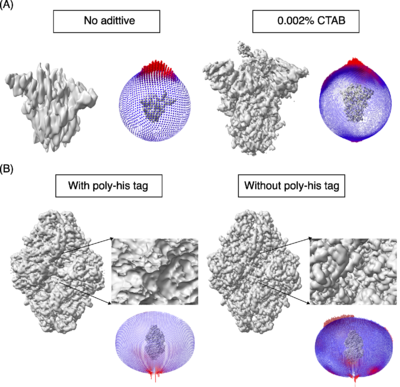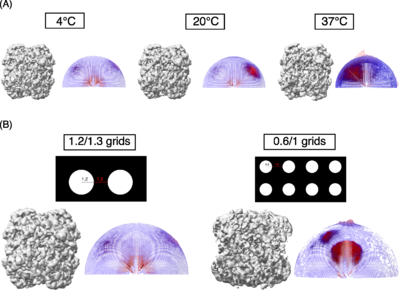Factors affecting macromolecule orientations in thin films formed in cryo-EM
Swati Yadav and Vinothkumar Kutti Ragunath [1]
Molecular Tour
Single particle cryo-EM has become a routine and indispensable technique in structural biology, where macromolecules are imaged with electrons as single particles and subsequently averaged to obtain a high-resolution 3D reconstruction. Single particle cryo-EM reconstruction utilizes the projection slice theorem to build a 3D map of a 3D object using 2D projections, generated when electrons transmitted through a thin specimen are recorded by a detector. The resolution and quality of the final map depend on many factors including heterogeneity in the specimen, adequate sampling of views and signal-to-noise of the images.
A key step in this process is to obtain a thin film of macromolecules (purified or as a mixture) in ice and the most routinely used method for obtaining such thin films was developed by Dubochet and his colleagues (Dubochet et al., 1988[2]). Obtaining the optimal conditions for freezing of a given macromolecule requires testing several parameters. At the moment, it is one of the rate-limiting steps in obtaining high-resolution maps by cryo-EM. During the freezing process, the macromolecules can encounter and interact with the air-water interface, sometimes resulting in a tendency to adapt one or more preferential orientations along with denaturation and dissociation in the case of multi-subunit complexes (D’Imprima et al., 2019[3]; Noble et al., 2018[4]; Glaeser and Han, 2017[5]). The 3D maps reconstructed from preferentially oriented macromolecules exhibit stretching of densities in one direction (also called anisotropy, where with enough particles the resolution will be high but the maps are not easily interpretable). One such example is the spike protein shown in Figure 1A, which illustrates the effects of orientation bias on the final reconstruction.
Figure 1: The models used as reference are PDBs 8h3d and 6cvm for the spike protein and b-galactosidase respectively. A) Spike protein, SARS-COV-2. (8h3d). (8wzi). B) β-galactosidase.
There are multiple ways to address orientation bias including the use of support layers like carbon or graphene, tilting of the stage and more commonly, the use of surfactants or detergents as small molecule additives during grid preparation (Liu and Wang, 2023[6]). There are a number of macromolecules where surfactants have been used to overcome the preferred orientation problem. In this work, we asked if an informed decision regarding the grid freezing conditions can be made based on the properties of the macromolecule.
We studied macromolecules of different sizes and symmetries (125-440 kDa, C1 to D3) and tested a few commonly used surfactants to overcome the orientation bias and observed that many of these surfactants are beneficial. One such example is cationic surfactant CTAB, which causes changes in the orientation distribution of SARS-CoV-2 spike protein as shown in Figure1A. Further, we tested the effect of poly-histidine tag on orientation distribution of macromolecules. Figure 1B shows the impact of the N-terminal poly-his tag on orientation in the case of the E. coli β-galactosidase enzyme. We assessed the improvement in orientation distribution with different measures including the orientation distribution plot after 3D refinement (Scheres 2012[7]), Efficiency of orientation distribution (Naydenova & Russo, 2017[8]), 3D-FSC (Tan et al., 2018[9]) and the map vs model FSC curve. We also tested the effect of grid hole size and temperature during grid preparation on orientation bias demonstrated using human erythrocyte catalase as an example (Figure 2).
Figure 2: Human erythrocyte catalase. (PDB ID 8wzj).
In summary, physical and chemical factors affecting macromolecule behaviour on grids have been studied to overcome the preferred orientation problem (Figure 3). These findings lay a platform in achieving optimal freezing conditions for any given macromolecule in the future.
References
- ↑ Yadav S, Vinothkumar KR. Factors affecting macromolecule orientations in thin films formed in cryo-EM. Acta Crystallogr D Struct Biol. 2024 Jul 1;80(Pt 7):535-550. PMID:38935342 doi:10.1107/S2059798324005229
- ↑ Dubochet J, Adrian M, Chang JJ, Homo JC, Lepault J, McDowall AW, Schultz P. Cryo-electron microscopy of vitrified specimens. Q Rev Biophys. 1988 May;21(2):129-228. PMID:3043536 doi:10.1017/s0033583500004297
- ↑ D'Imprima E, Floris D, Joppe M, Sánchez R, Grininger M, Kühlbrandt W. Protein denaturation at the air-water interface and how to prevent it. Elife. 2019 Apr 1;8:e42747. PMID:30932812 doi:10.7554/eLife.42747
- ↑ Noble AJ, Wei H, Dandey VP, Zhang Z, Tan YZ, Potter CS, Carragher B. Reducing effects of particle adsorption to the air-water interface in cryo-EM. Nat Methods. 2018 Oct;15(10):793-795. PMID:30250056 doi:10.1038/s41592-018-0139-3
- ↑ Glaeser RM, Han BG. Opinion: hazards faced by macromolecules when confined to thin aqueous films. Biophys Rep. 2017;3(1):1-7. PMID:28781996 doi:10.1007/s41048-016-0026-3
- ↑ Liu N, Wang HW. Better Cryo-EM Specimen Preparation: How to Deal with the Air-Water Interface? J Mol Biol. 2023 May 1;435(9):167926. PMID:36563741 doi:10.1016/j.jmb.2022.167926
- ↑ Scheres SH. RELION: implementation of a Bayesian approach to cryo-EM structure determination. J Struct Biol. 2012 Dec;180(3):519-30. doi: 10.1016/j.jsb.2012.09.006. Epub 2012 , Sep 19. PMID:23000701 doi:http://dx.doi.org/10.1016/j.jsb.2012.09.006
- ↑ Naydenova K, Russo CJ. Measuring the effects of particle orientation to improve the efficiency of electron cryomicroscopy. Nat Commun. 2017 Sep 20;8(1):629. PMID:28931821 doi:10.1038/s41467-017-00782-3
- ↑ Tan YZ, Baldwin PR, Davis JH, Williamson JR, Potter CS, Carragher B, Lyumkis D. Addressing preferred specimen orientation in single-particle cryo-EM through tilting. Nat Methods. 2017 Aug;14(8):793-796. PMID:28671674 doi:10.1038/nmeth.4347




